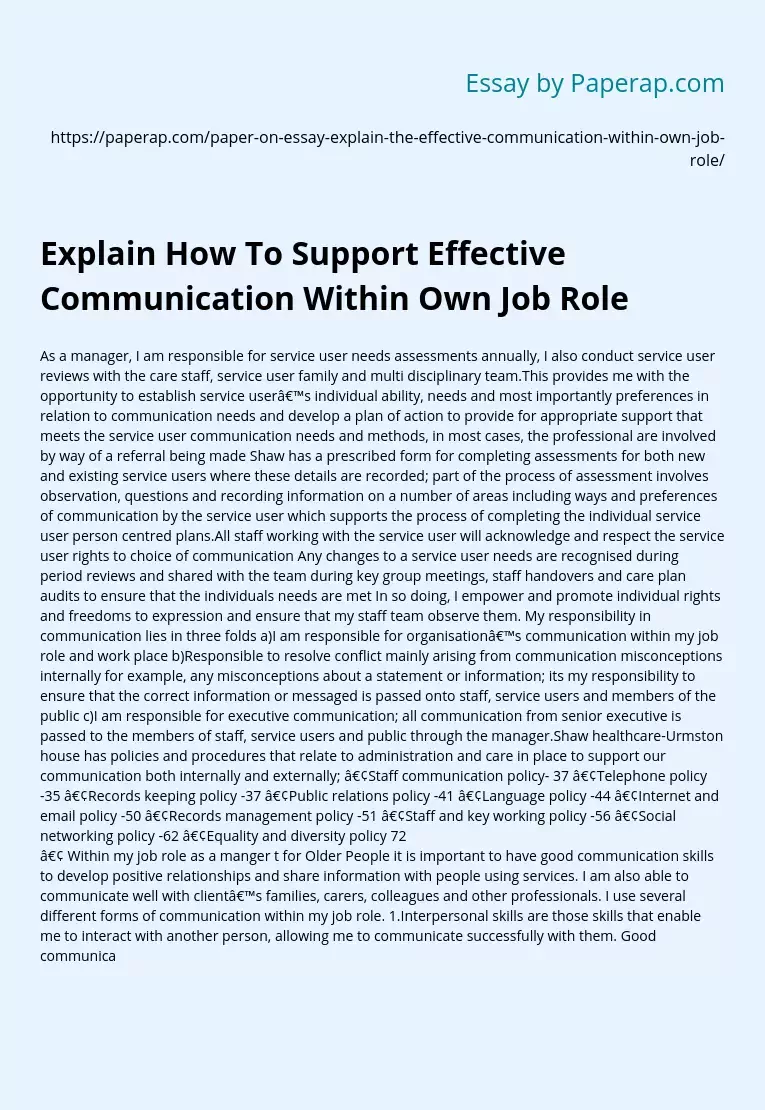Explain How To Support Effective Communication Within Own Job Role
As a manager, I am responsible for service user needs assessments annually, I also conduct service user reviews with the care staff, service user family and multi disciplinary team.This provides me with the opportunity to establish service user’s individual ability, needs and most importantly preferences in relation to communication needs and develop a plan of action to provide for appropriate support that meets the service user communication needs and methods, in most cases, the professional are involved by way of a referral being made Shaw has a prescribed form for completing assessments for both new and existing service users where these details are recorded; part of the process of assessment involves observation, questions and recording information on a number of areas including ways and preferences of communication by the service user which supports the process of completing the individual service user person centred plans.
All staff working with the service user will acknowledge and respect the service user rights to choice of communication Any changes to a service user needs are recognised during period reviews and shared with the team during key group meetings, staff handovers and care plan audits to ensure that the individuals needs are met In so doing, I empower and promote individual rights and freedoms to expression and ensure that my staff team observe them.
My responsibility in communication lies in three folds a)I am responsible for organisation’s communication within my job role and work place b)Responsible to resolve conflict mainly arising from communication misconceptions internally for example, any misconceptions about a statement or information; its my responsibility to ensure that the correct information or messaged is passed onto staff, service users and members of the public c)I am responsible for executive communication; all communication from senior executive is passed to the members of staff, service users and public through the manager.
Shaw healthcare-Urmston house has policies and procedures that relate to administration and care in place to support our communication both internally and externally; •Staff communication policy- 37 •Telephone policy -35 •Records keeping policy -37 •Public relations policy -41 •Language policy -44 •Internet and email policy -50 •Records management policy -51 •Staff and key working policy -56 •Social networking policy -62 •Equality and diversity policy 72
• Within my job role as a manger t for Older People it is important to have good communication skills to develop positive relationships and share information with people using services. I am also able to communicate well with client’s families, carers, colleagues and other professionals. I use several different forms of communication within my job role. 1.Interpersonal skills are those skills that enable me to interact with another person, allowing me to communicate successfully with them. Good communication skills are vital for working in Health & Social Care as they help to: •Develop positive relationships with service users and their family and friends, so they can understand and meet their needs. •Develop positive relationships with work colleagues and other professionals. •Share information with people using the services, by providing and receiving information. •Report on the work I do with people. One to one communication and providing feedback: One to one communication means one person communicating with another person with no other people joining in. I use this form of communication daily within my job role.Examples would be communication between me and a client, Communication between me and the District Nurse in relation to a client, Communication between me and the GP in relation to a client, Communication between me and my line manager to discuss cases and approval for services etc. 2. Verbal communication: Verbal communication uses words to present ideas, thoughts and feelings. Good verbal communication is the ability to both explain and present your ideas clearly through the spoken work, and to listen carefully to other people. E. g. telephone call to GP, District Nurse, OT, service users, carers. Discussion at team meetings etc. 3. Non-Verbal – refers to procedure of communicating with a person or party without using any form of speech Sometimes people may communicate things that they care about mainly by using nonverbal signals.Wordless communication, or body language, includes facial expressions, body movement and gestures, eye contact, posture, the tone of voice, and even muscle tension and breathing. The way people look, listen, move, and react to another person tells them more about how they are feeling than words alone ever can. Developing the ability to understand and use nonverbal communication can help to connect with others, express what you really mean, navigate challenging situations, and build better relationships at work. Key people that I work with in partnership with to ensure that the best outcome is achieved for the individual’s communication abilities include; •Family and friends •Speech and Language therapist •Psychologist •General practitioners (GPs)•Occupational therapist •Care staff Behaviour response team •Social workers •Advocate Staff are supported to attend training on different communication needs of different service users including taking into account any hearing or visual impairments, understand the importance of verbal and non-verbal communication, the barriers to effective communication, support services available from the multi disciplinary team and where to receive specialist service. Urmston house pays for services of an independent advocate to ensure effective representation of service users due to lack of ability to advocate for themselves caused by health conditions ;both severe learning disability and sensory impairment
Explain How To Support Effective Communication Within Own Job Role. (2019, Dec 05). Retrieved from https://paperap.com/paper-on-essay-explain-the-effective-communication-within-own-job-role/

